ADNOC AI Policies: Research Proposal on Oil Field Transformation
VerifiedAdded on 2022/12/28
|17
|3848
|44
Project
AI Summary
This research proposal explores the opportunities and challenges presented by the implementation of Artificial Intelligence (AI) in the digital transformation of the oil fields within the United Arab Emirates (UAE), with a particular focus on the Abu Dhabi National Oil Company (ADNOC). The study aims to critically review ADNOC's policies and governance surrounding AI integration, assessing how these elements impact business operations and the broader oil and gas industry. The research will investigate the digital transformation facilitated by AI, examining how it enhances business operations and the perspectives of ADNOC regarding AI implementation, including the role of policies and governance. The study also seeks to identify potential opportunities and challenges arising from these policies and governance structures. The research questions will focus on the impact of AI on business opportunities and challenges in the oil field transformation. The literature review will examine existing research on AI governance, the digital transformation of oil fields, and the case of ADNOC. The methodology includes research philosophy, design, methodological approaches, ethical and risk considerations, and an expected timescale for the research, as well as implications for the field. The research is designed to provide insights into the legal and operational frameworks required for successful AI implementation in the UAE's oil sector.
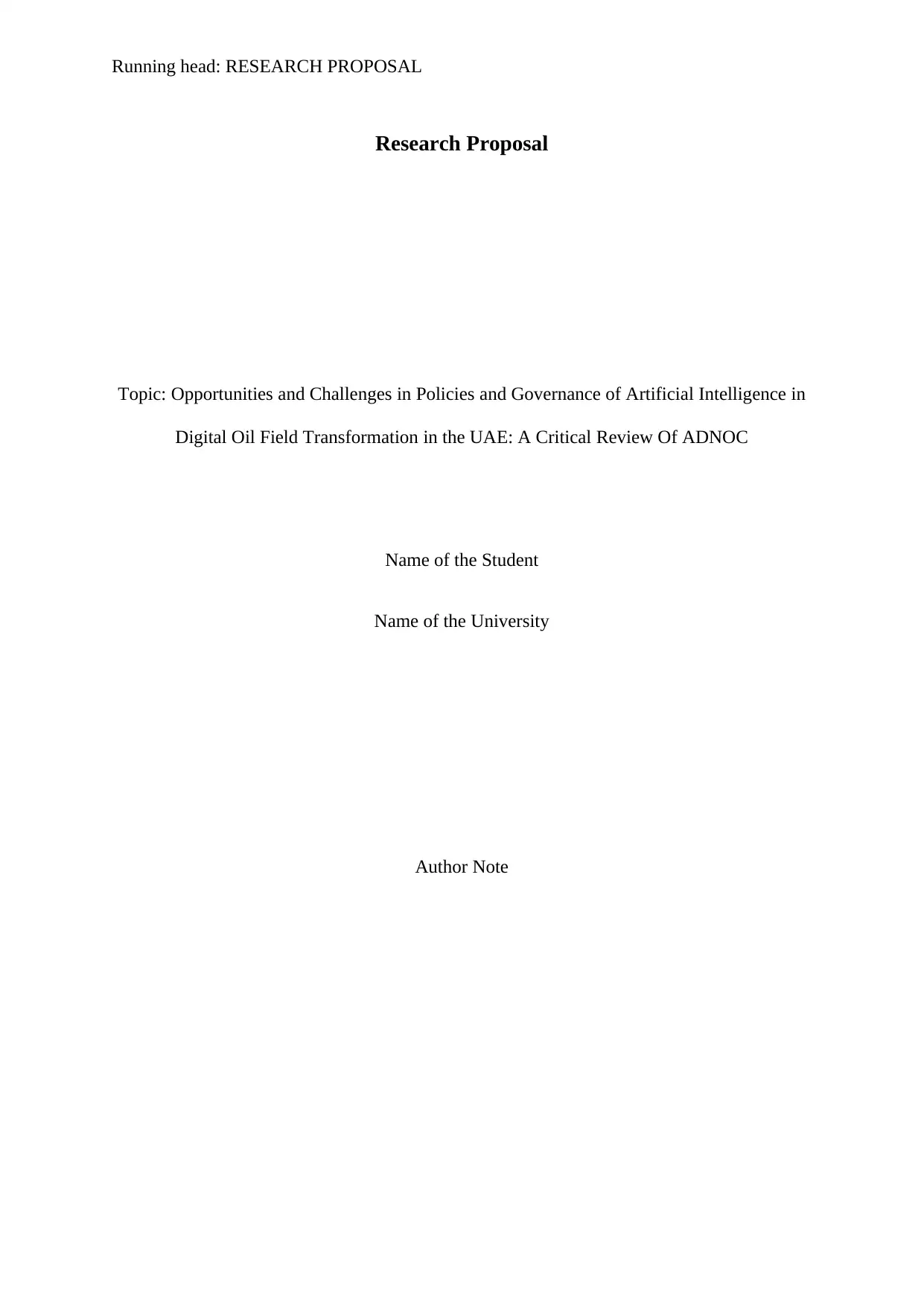
Running head: RESEARCH PROPOSAL
Research Proposal
Topic: Opportunities and Challenges in Policies and Governance of Artificial Intelligence in
Digital Oil Field Transformation in the UAE: A Critical Review Of ADNOC
Name of the Student
Name of the University
Author Note
Research Proposal
Topic: Opportunities and Challenges in Policies and Governance of Artificial Intelligence in
Digital Oil Field Transformation in the UAE: A Critical Review Of ADNOC
Name of the Student
Name of the University
Author Note
Paraphrase This Document
Need a fresh take? Get an instant paraphrase of this document with our AI Paraphraser
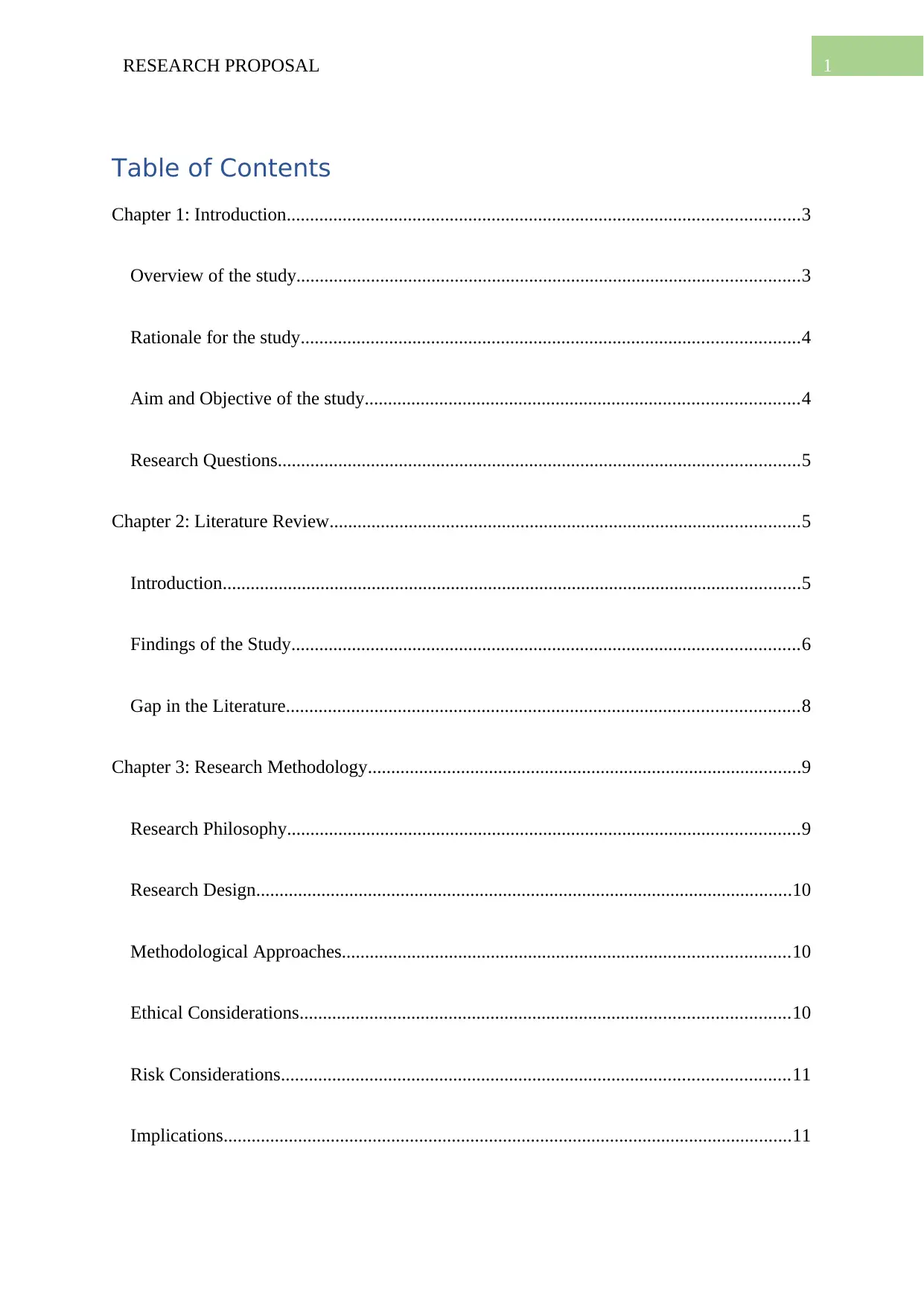
1RESEARCH PROPOSAL
Table of Contents
Chapter 1: Introduction..............................................................................................................3
Overview of the study............................................................................................................3
Rationale for the study...........................................................................................................4
Aim and Objective of the study.............................................................................................4
Research Questions................................................................................................................5
Chapter 2: Literature Review.....................................................................................................5
Introduction............................................................................................................................5
Findings of the Study.............................................................................................................6
Gap in the Literature..............................................................................................................8
Chapter 3: Research Methodology.............................................................................................9
Research Philosophy..............................................................................................................9
Research Design...................................................................................................................10
Methodological Approaches................................................................................................10
Ethical Considerations.........................................................................................................10
Risk Considerations.............................................................................................................11
Implications..........................................................................................................................11
Table of Contents
Chapter 1: Introduction..............................................................................................................3
Overview of the study............................................................................................................3
Rationale for the study...........................................................................................................4
Aim and Objective of the study.............................................................................................4
Research Questions................................................................................................................5
Chapter 2: Literature Review.....................................................................................................5
Introduction............................................................................................................................5
Findings of the Study.............................................................................................................6
Gap in the Literature..............................................................................................................8
Chapter 3: Research Methodology.............................................................................................9
Research Philosophy..............................................................................................................9
Research Design...................................................................................................................10
Methodological Approaches................................................................................................10
Ethical Considerations.........................................................................................................10
Risk Considerations.............................................................................................................11
Implications..........................................................................................................................11

2RESEARCH PROPOSAL
Expected Timescale.............................................................................................................12
References................................................................................................................................13
Expected Timescale.............................................................................................................12
References................................................................................................................................13
⊘ This is a preview!⊘
Do you want full access?
Subscribe today to unlock all pages.

Trusted by 1+ million students worldwide
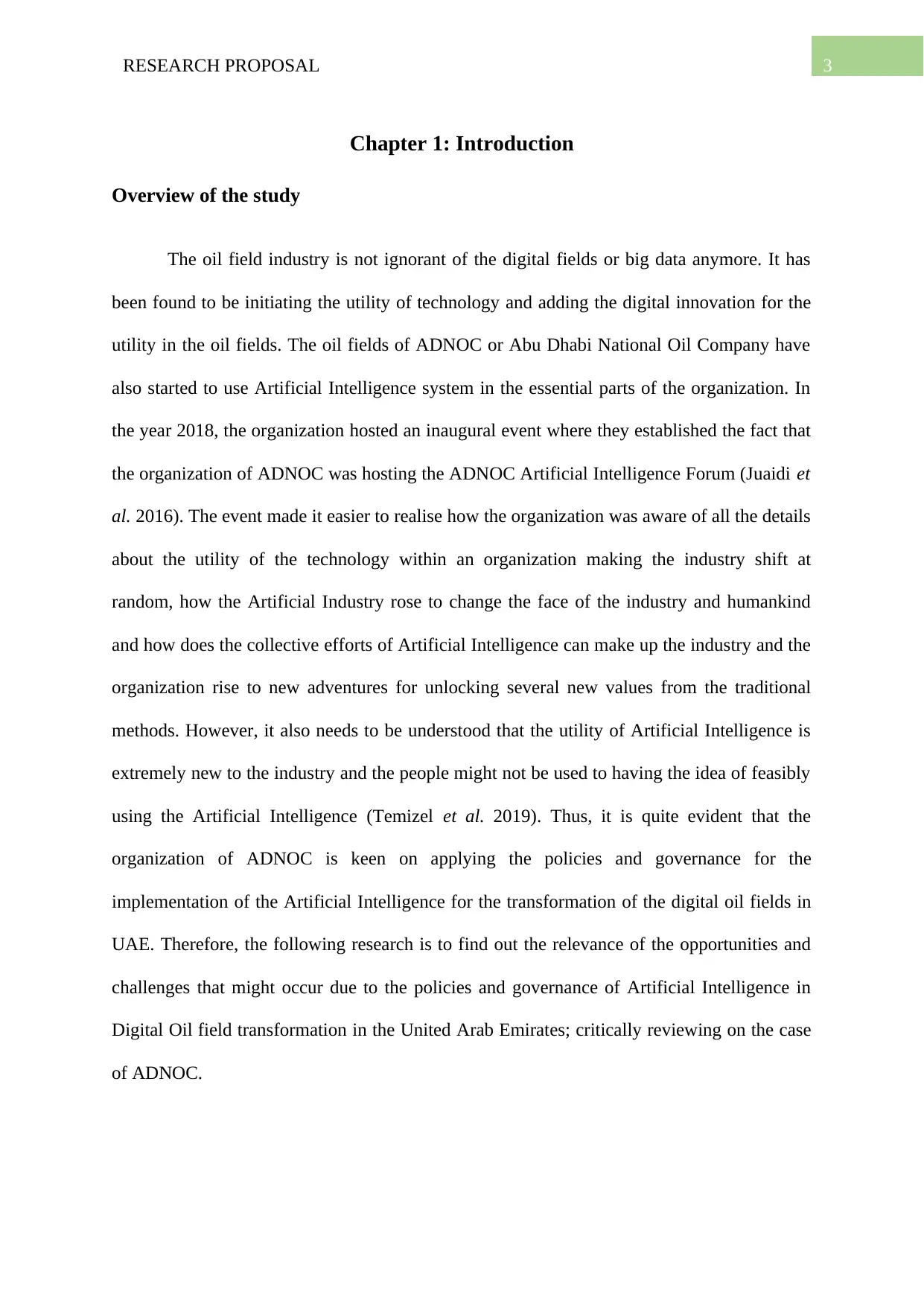
3RESEARCH PROPOSAL
Chapter 1: Introduction
Overview of the study
The oil field industry is not ignorant of the digital fields or big data anymore. It has
been found to be initiating the utility of technology and adding the digital innovation for the
utility in the oil fields. The oil fields of ADNOC or Abu Dhabi National Oil Company have
also started to use Artificial Intelligence system in the essential parts of the organization. In
the year 2018, the organization hosted an inaugural event where they established the fact that
the organization of ADNOC was hosting the ADNOC Artificial Intelligence Forum (Juaidi et
al. 2016). The event made it easier to realise how the organization was aware of all the details
about the utility of the technology within an organization making the industry shift at
random, how the Artificial Industry rose to change the face of the industry and humankind
and how does the collective efforts of Artificial Intelligence can make up the industry and the
organization rise to new adventures for unlocking several new values from the traditional
methods. However, it also needs to be understood that the utility of Artificial Intelligence is
extremely new to the industry and the people might not be used to having the idea of feasibly
using the Artificial Intelligence (Temizel et al. 2019). Thus, it is quite evident that the
organization of ADNOC is keen on applying the policies and governance for the
implementation of the Artificial Intelligence for the transformation of the digital oil fields in
UAE. Therefore, the following research is to find out the relevance of the opportunities and
challenges that might occur due to the policies and governance of Artificial Intelligence in
Digital Oil field transformation in the United Arab Emirates; critically reviewing on the case
of ADNOC.
Chapter 1: Introduction
Overview of the study
The oil field industry is not ignorant of the digital fields or big data anymore. It has
been found to be initiating the utility of technology and adding the digital innovation for the
utility in the oil fields. The oil fields of ADNOC or Abu Dhabi National Oil Company have
also started to use Artificial Intelligence system in the essential parts of the organization. In
the year 2018, the organization hosted an inaugural event where they established the fact that
the organization of ADNOC was hosting the ADNOC Artificial Intelligence Forum (Juaidi et
al. 2016). The event made it easier to realise how the organization was aware of all the details
about the utility of the technology within an organization making the industry shift at
random, how the Artificial Industry rose to change the face of the industry and humankind
and how does the collective efforts of Artificial Intelligence can make up the industry and the
organization rise to new adventures for unlocking several new values from the traditional
methods. However, it also needs to be understood that the utility of Artificial Intelligence is
extremely new to the industry and the people might not be used to having the idea of feasibly
using the Artificial Intelligence (Temizel et al. 2019). Thus, it is quite evident that the
organization of ADNOC is keen on applying the policies and governance for the
implementation of the Artificial Intelligence for the transformation of the digital oil fields in
UAE. Therefore, the following research is to find out the relevance of the opportunities and
challenges that might occur due to the policies and governance of Artificial Intelligence in
Digital Oil field transformation in the United Arab Emirates; critically reviewing on the case
of ADNOC.
Paraphrase This Document
Need a fresh take? Get an instant paraphrase of this document with our AI Paraphraser
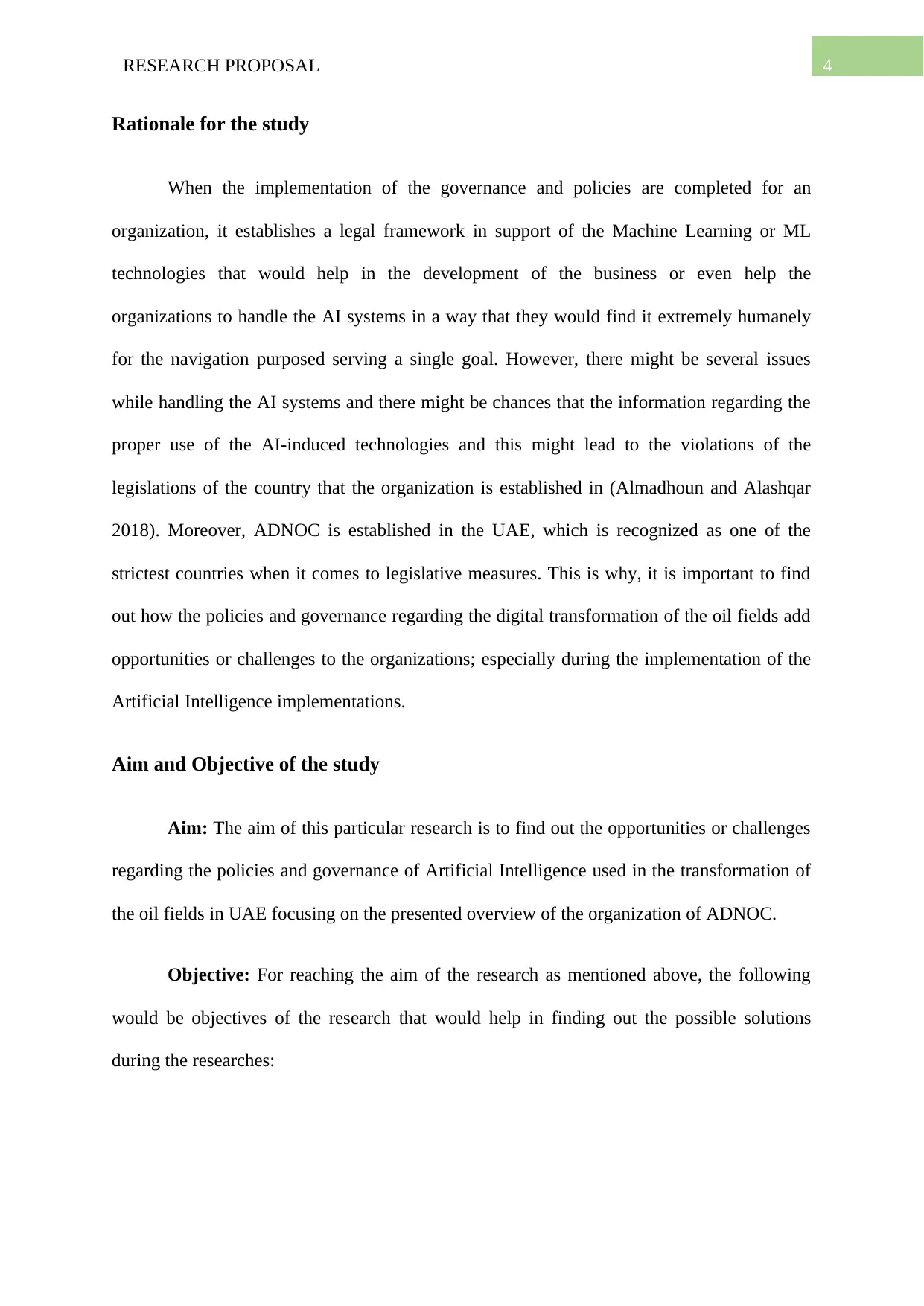
4RESEARCH PROPOSAL
Rationale for the study
When the implementation of the governance and policies are completed for an
organization, it establishes a legal framework in support of the Machine Learning or ML
technologies that would help in the development of the business or even help the
organizations to handle the AI systems in a way that they would find it extremely humanely
for the navigation purposed serving a single goal. However, there might be several issues
while handling the AI systems and there might be chances that the information regarding the
proper use of the AI-induced technologies and this might lead to the violations of the
legislations of the country that the organization is established in (Almadhoun and Alashqar
2018). Moreover, ADNOC is established in the UAE, which is recognized as one of the
strictest countries when it comes to legislative measures. This is why, it is important to find
out how the policies and governance regarding the digital transformation of the oil fields add
opportunities or challenges to the organizations; especially during the implementation of the
Artificial Intelligence implementations.
Aim and Objective of the study
Aim: The aim of this particular research is to find out the opportunities or challenges
regarding the policies and governance of Artificial Intelligence used in the transformation of
the oil fields in UAE focusing on the presented overview of the organization of ADNOC.
Objective: For reaching the aim of the research as mentioned above, the following
would be objectives of the research that would help in finding out the possible solutions
during the researches:
Rationale for the study
When the implementation of the governance and policies are completed for an
organization, it establishes a legal framework in support of the Machine Learning or ML
technologies that would help in the development of the business or even help the
organizations to handle the AI systems in a way that they would find it extremely humanely
for the navigation purposed serving a single goal. However, there might be several issues
while handling the AI systems and there might be chances that the information regarding the
proper use of the AI-induced technologies and this might lead to the violations of the
legislations of the country that the organization is established in (Almadhoun and Alashqar
2018). Moreover, ADNOC is established in the UAE, which is recognized as one of the
strictest countries when it comes to legislative measures. This is why, it is important to find
out how the policies and governance regarding the digital transformation of the oil fields add
opportunities or challenges to the organizations; especially during the implementation of the
Artificial Intelligence implementations.
Aim and Objective of the study
Aim: The aim of this particular research is to find out the opportunities or challenges
regarding the policies and governance of Artificial Intelligence used in the transformation of
the oil fields in UAE focusing on the presented overview of the organization of ADNOC.
Objective: For reaching the aim of the research as mentioned above, the following
would be objectives of the research that would help in finding out the possible solutions
during the researches:
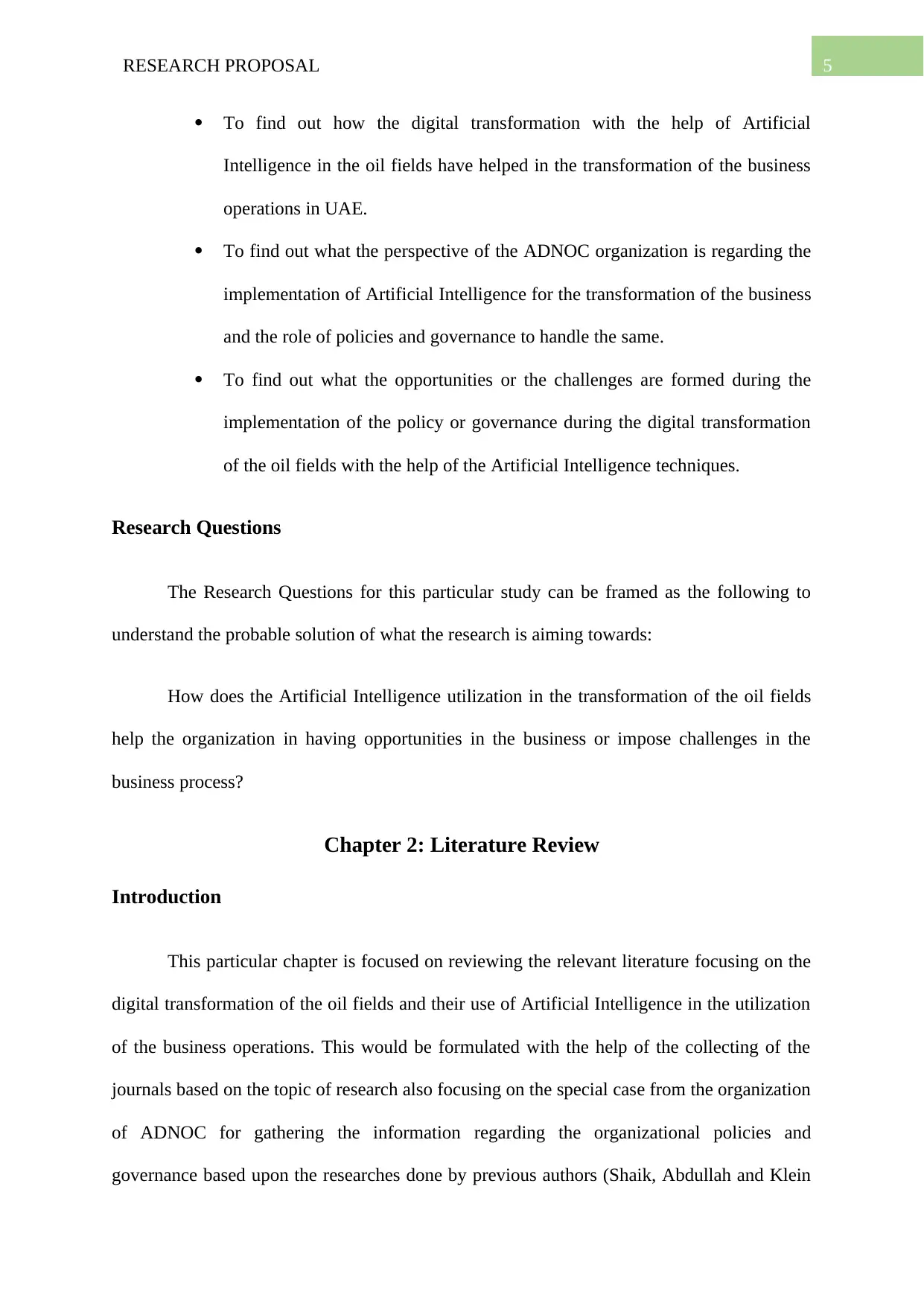
5RESEARCH PROPOSAL
To find out how the digital transformation with the help of Artificial
Intelligence in the oil fields have helped in the transformation of the business
operations in UAE.
To find out what the perspective of the ADNOC organization is regarding the
implementation of Artificial Intelligence for the transformation of the business
and the role of policies and governance to handle the same.
To find out what the opportunities or the challenges are formed during the
implementation of the policy or governance during the digital transformation
of the oil fields with the help of the Artificial Intelligence techniques.
Research Questions
The Research Questions for this particular study can be framed as the following to
understand the probable solution of what the research is aiming towards:
How does the Artificial Intelligence utilization in the transformation of the oil fields
help the organization in having opportunities in the business or impose challenges in the
business process?
Chapter 2: Literature Review
Introduction
This particular chapter is focused on reviewing the relevant literature focusing on the
digital transformation of the oil fields and their use of Artificial Intelligence in the utilization
of the business operations. This would be formulated with the help of the collecting of the
journals based on the topic of research also focusing on the special case from the organization
of ADNOC for gathering the information regarding the organizational policies and
governance based upon the researches done by previous authors (Shaik, Abdullah and Klein
To find out how the digital transformation with the help of Artificial
Intelligence in the oil fields have helped in the transformation of the business
operations in UAE.
To find out what the perspective of the ADNOC organization is regarding the
implementation of Artificial Intelligence for the transformation of the business
and the role of policies and governance to handle the same.
To find out what the opportunities or the challenges are formed during the
implementation of the policy or governance during the digital transformation
of the oil fields with the help of the Artificial Intelligence techniques.
Research Questions
The Research Questions for this particular study can be framed as the following to
understand the probable solution of what the research is aiming towards:
How does the Artificial Intelligence utilization in the transformation of the oil fields
help the organization in having opportunities in the business or impose challenges in the
business process?
Chapter 2: Literature Review
Introduction
This particular chapter is focused on reviewing the relevant literature focusing on the
digital transformation of the oil fields and their use of Artificial Intelligence in the utilization
of the business operations. This would be formulated with the help of the collecting of the
journals based on the topic of research also focusing on the special case from the organization
of ADNOC for gathering the information regarding the organizational policies and
governance based upon the researches done by previous authors (Shaik, Abdullah and Klein
⊘ This is a preview!⊘
Do you want full access?
Subscribe today to unlock all pages.

Trusted by 1+ million students worldwide
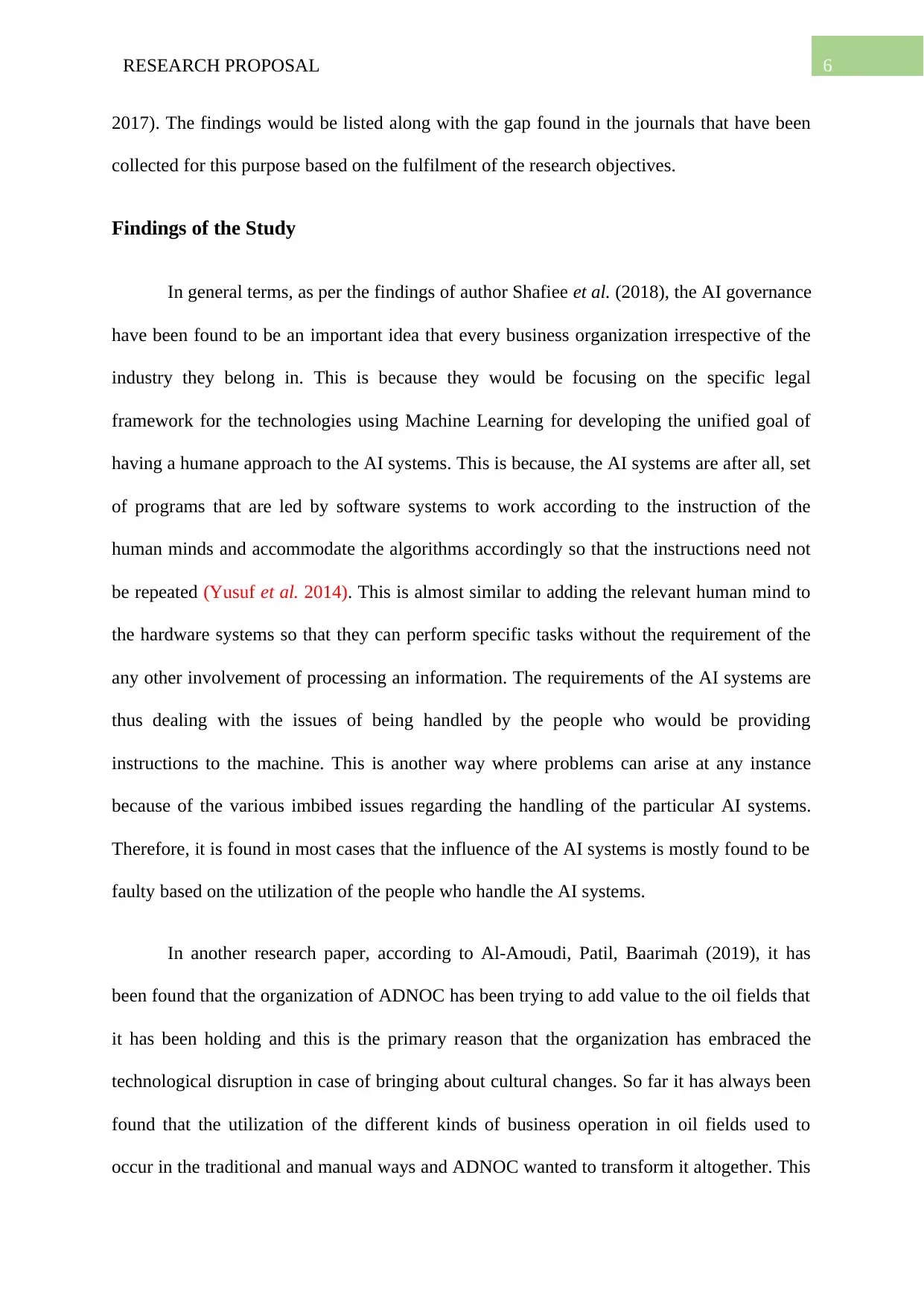
6RESEARCH PROPOSAL
2017). The findings would be listed along with the gap found in the journals that have been
collected for this purpose based on the fulfilment of the research objectives.
Findings of the Study
In general terms, as per the findings of author Shafiee et al. (2018), the AI governance
have been found to be an important idea that every business organization irrespective of the
industry they belong in. This is because they would be focusing on the specific legal
framework for the technologies using Machine Learning for developing the unified goal of
having a humane approach to the AI systems. This is because, the AI systems are after all, set
of programs that are led by software systems to work according to the instruction of the
human minds and accommodate the algorithms accordingly so that the instructions need not
be repeated (Yusuf et al. 2014). This is almost similar to adding the relevant human mind to
the hardware systems so that they can perform specific tasks without the requirement of the
any other involvement of processing an information. The requirements of the AI systems are
thus dealing with the issues of being handled by the people who would be providing
instructions to the machine. This is another way where problems can arise at any instance
because of the various imbibed issues regarding the handling of the particular AI systems.
Therefore, it is found in most cases that the influence of the AI systems is mostly found to be
faulty based on the utilization of the people who handle the AI systems.
In another research paper, according to Al-Amoudi, Patil, Baarimah (2019), it has
been found that the organization of ADNOC has been trying to add value to the oil fields that
it has been holding and this is the primary reason that the organization has embraced the
technological disruption in case of bringing about cultural changes. So far it has always been
found that the utilization of the different kinds of business operation in oil fields used to
occur in the traditional and manual ways and ADNOC wanted to transform it altogether. This
2017). The findings would be listed along with the gap found in the journals that have been
collected for this purpose based on the fulfilment of the research objectives.
Findings of the Study
In general terms, as per the findings of author Shafiee et al. (2018), the AI governance
have been found to be an important idea that every business organization irrespective of the
industry they belong in. This is because they would be focusing on the specific legal
framework for the technologies using Machine Learning for developing the unified goal of
having a humane approach to the AI systems. This is because, the AI systems are after all, set
of programs that are led by software systems to work according to the instruction of the
human minds and accommodate the algorithms accordingly so that the instructions need not
be repeated (Yusuf et al. 2014). This is almost similar to adding the relevant human mind to
the hardware systems so that they can perform specific tasks without the requirement of the
any other involvement of processing an information. The requirements of the AI systems are
thus dealing with the issues of being handled by the people who would be providing
instructions to the machine. This is another way where problems can arise at any instance
because of the various imbibed issues regarding the handling of the particular AI systems.
Therefore, it is found in most cases that the influence of the AI systems is mostly found to be
faulty based on the utilization of the people who handle the AI systems.
In another research paper, according to Al-Amoudi, Patil, Baarimah (2019), it has
been found that the organization of ADNOC has been trying to add value to the oil fields that
it has been holding and this is the primary reason that the organization has embraced the
technological disruption in case of bringing about cultural changes. So far it has always been
found that the utilization of the different kinds of business operation in oil fields used to
occur in the traditional and manual ways and ADNOC wanted to transform it altogether. This
Paraphrase This Document
Need a fresh take? Get an instant paraphrase of this document with our AI Paraphraser
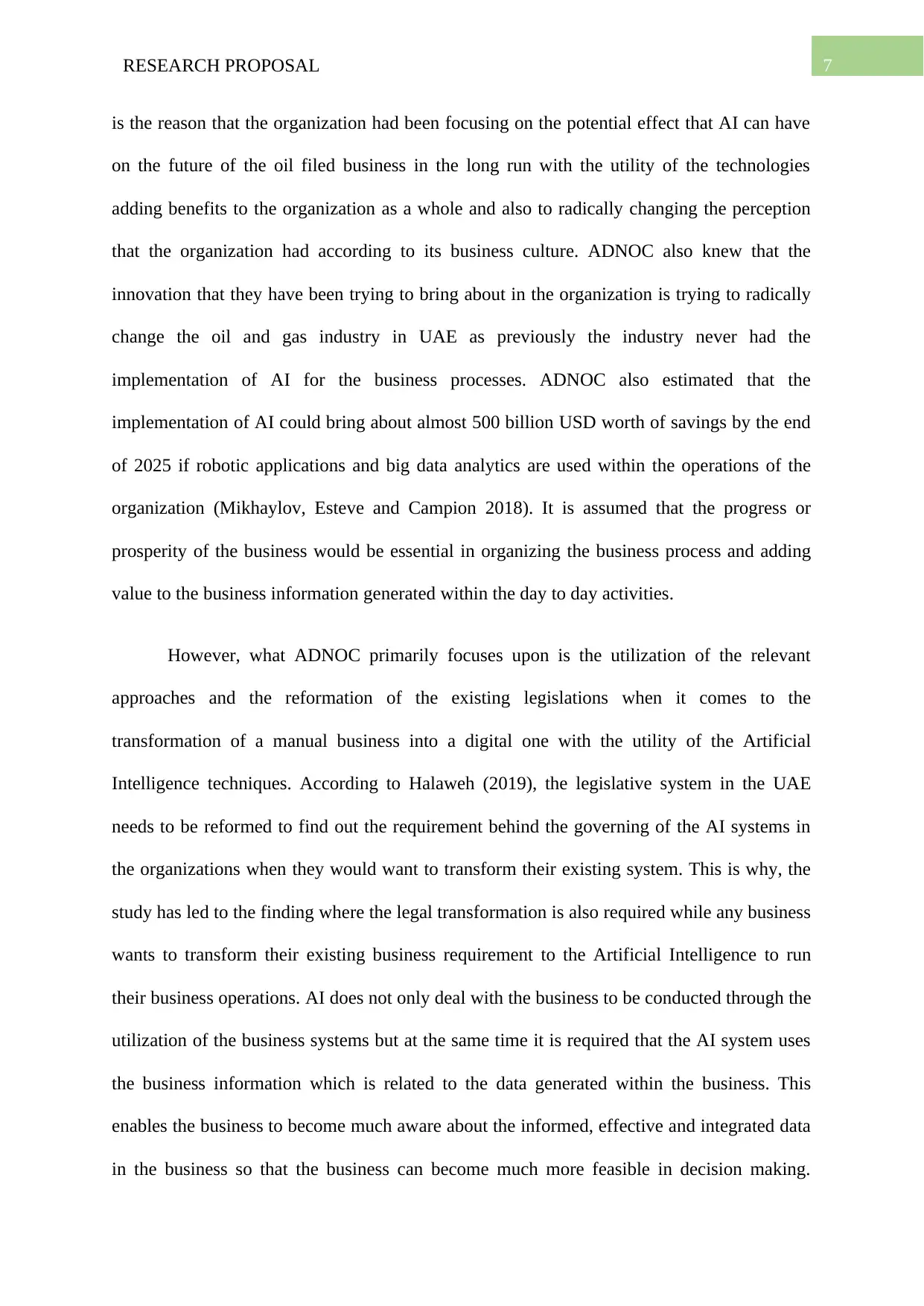
7RESEARCH PROPOSAL
is the reason that the organization had been focusing on the potential effect that AI can have
on the future of the oil filed business in the long run with the utility of the technologies
adding benefits to the organization as a whole and also to radically changing the perception
that the organization had according to its business culture. ADNOC also knew that the
innovation that they have been trying to bring about in the organization is trying to radically
change the oil and gas industry in UAE as previously the industry never had the
implementation of AI for the business processes. ADNOC also estimated that the
implementation of AI could bring about almost 500 billion USD worth of savings by the end
of 2025 if robotic applications and big data analytics are used within the operations of the
organization (Mikhaylov, Esteve and Campion 2018). It is assumed that the progress or
prosperity of the business would be essential in organizing the business process and adding
value to the business information generated within the day to day activities.
However, what ADNOC primarily focuses upon is the utilization of the relevant
approaches and the reformation of the existing legislations when it comes to the
transformation of a manual business into a digital one with the utility of the Artificial
Intelligence techniques. According to Halaweh (2019), the legislative system in the UAE
needs to be reformed to find out the requirement behind the governing of the AI systems in
the organizations when they would want to transform their existing system. This is why, the
study has led to the finding where the legal transformation is also required while any business
wants to transform their existing business requirement to the Artificial Intelligence to run
their business operations. AI does not only deal with the business to be conducted through the
utilization of the business systems but at the same time it is required that the AI system uses
the business information which is related to the data generated within the business. This
enables the business to become much aware about the informed, effective and integrated data
in the business so that the business can become much more feasible in decision making.
is the reason that the organization had been focusing on the potential effect that AI can have
on the future of the oil filed business in the long run with the utility of the technologies
adding benefits to the organization as a whole and also to radically changing the perception
that the organization had according to its business culture. ADNOC also knew that the
innovation that they have been trying to bring about in the organization is trying to radically
change the oil and gas industry in UAE as previously the industry never had the
implementation of AI for the business processes. ADNOC also estimated that the
implementation of AI could bring about almost 500 billion USD worth of savings by the end
of 2025 if robotic applications and big data analytics are used within the operations of the
organization (Mikhaylov, Esteve and Campion 2018). It is assumed that the progress or
prosperity of the business would be essential in organizing the business process and adding
value to the business information generated within the day to day activities.
However, what ADNOC primarily focuses upon is the utilization of the relevant
approaches and the reformation of the existing legislations when it comes to the
transformation of a manual business into a digital one with the utility of the Artificial
Intelligence techniques. According to Halaweh (2019), the legislative system in the UAE
needs to be reformed to find out the requirement behind the governing of the AI systems in
the organizations when they would want to transform their existing system. This is why, the
study has led to the finding where the legal transformation is also required while any business
wants to transform their existing business requirement to the Artificial Intelligence to run
their business operations. AI does not only deal with the business to be conducted through the
utilization of the business systems but at the same time it is required that the AI system uses
the business information which is related to the data generated within the business. This
enables the business to become much aware about the informed, effective and integrated data
in the business so that the business can become much more feasible in decision making.
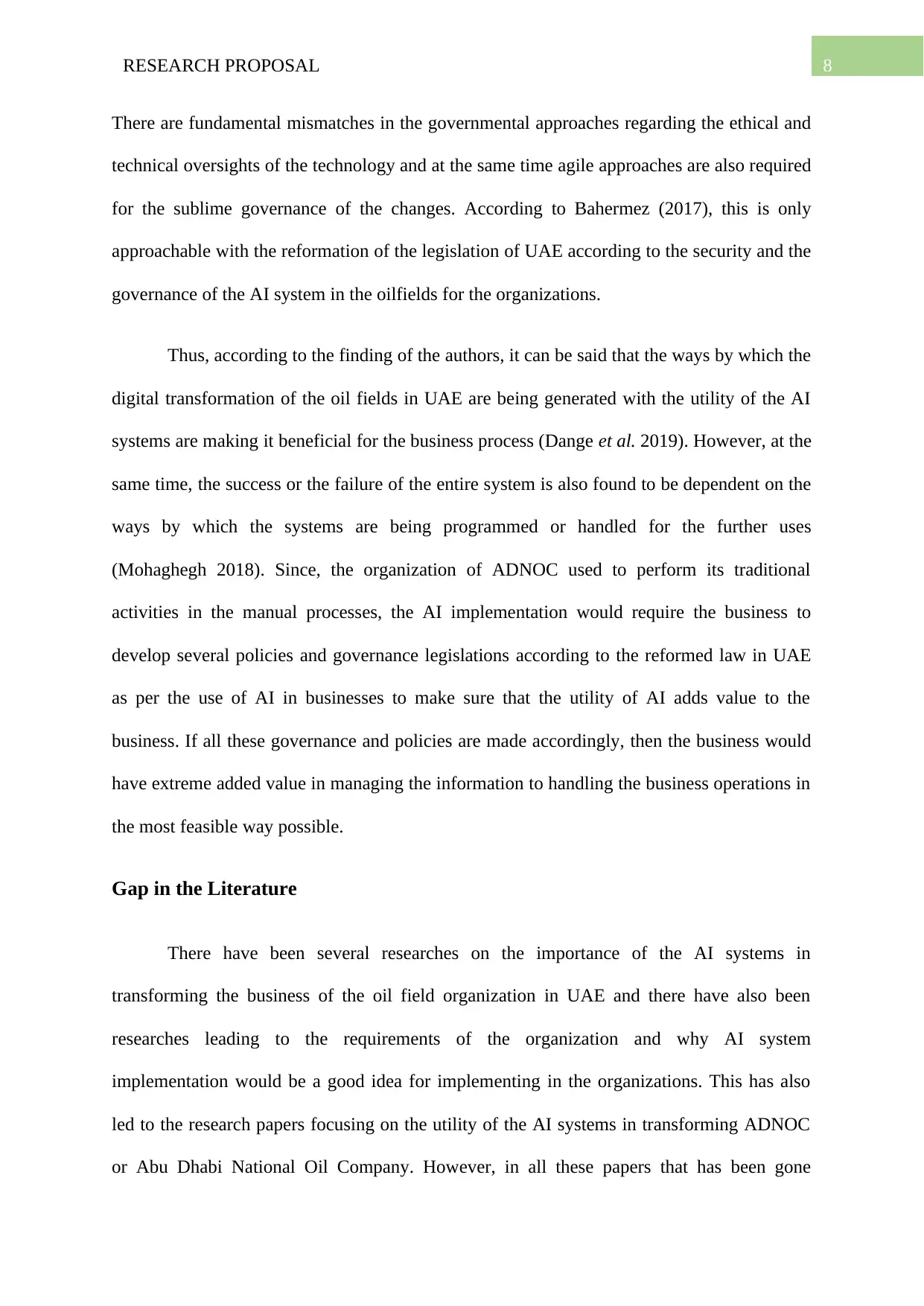
8RESEARCH PROPOSAL
There are fundamental mismatches in the governmental approaches regarding the ethical and
technical oversights of the technology and at the same time agile approaches are also required
for the sublime governance of the changes. According to Bahermez (2017), this is only
approachable with the reformation of the legislation of UAE according to the security and the
governance of the AI system in the oilfields for the organizations.
Thus, according to the finding of the authors, it can be said that the ways by which the
digital transformation of the oil fields in UAE are being generated with the utility of the AI
systems are making it beneficial for the business process (Dange et al. 2019). However, at the
same time, the success or the failure of the entire system is also found to be dependent on the
ways by which the systems are being programmed or handled for the further uses
(Mohaghegh 2018). Since, the organization of ADNOC used to perform its traditional
activities in the manual processes, the AI implementation would require the business to
develop several policies and governance legislations according to the reformed law in UAE
as per the use of AI in businesses to make sure that the utility of AI adds value to the
business. If all these governance and policies are made accordingly, then the business would
have extreme added value in managing the information to handling the business operations in
the most feasible way possible.
Gap in the Literature
There have been several researches on the importance of the AI systems in
transforming the business of the oil field organization in UAE and there have also been
researches leading to the requirements of the organization and why AI system
implementation would be a good idea for implementing in the organizations. This has also
led to the research papers focusing on the utility of the AI systems in transforming ADNOC
or Abu Dhabi National Oil Company. However, in all these papers that has been gone
There are fundamental mismatches in the governmental approaches regarding the ethical and
technical oversights of the technology and at the same time agile approaches are also required
for the sublime governance of the changes. According to Bahermez (2017), this is only
approachable with the reformation of the legislation of UAE according to the security and the
governance of the AI system in the oilfields for the organizations.
Thus, according to the finding of the authors, it can be said that the ways by which the
digital transformation of the oil fields in UAE are being generated with the utility of the AI
systems are making it beneficial for the business process (Dange et al. 2019). However, at the
same time, the success or the failure of the entire system is also found to be dependent on the
ways by which the systems are being programmed or handled for the further uses
(Mohaghegh 2018). Since, the organization of ADNOC used to perform its traditional
activities in the manual processes, the AI implementation would require the business to
develop several policies and governance legislations according to the reformed law in UAE
as per the use of AI in businesses to make sure that the utility of AI adds value to the
business. If all these governance and policies are made accordingly, then the business would
have extreme added value in managing the information to handling the business operations in
the most feasible way possible.
Gap in the Literature
There have been several researches on the importance of the AI systems in
transforming the business of the oil field organization in UAE and there have also been
researches leading to the requirements of the organization and why AI system
implementation would be a good idea for implementing in the organizations. This has also
led to the research papers focusing on the utility of the AI systems in transforming ADNOC
or Abu Dhabi National Oil Company. However, in all these papers that has been gone
⊘ This is a preview!⊘
Do you want full access?
Subscribe today to unlock all pages.

Trusted by 1+ million students worldwide
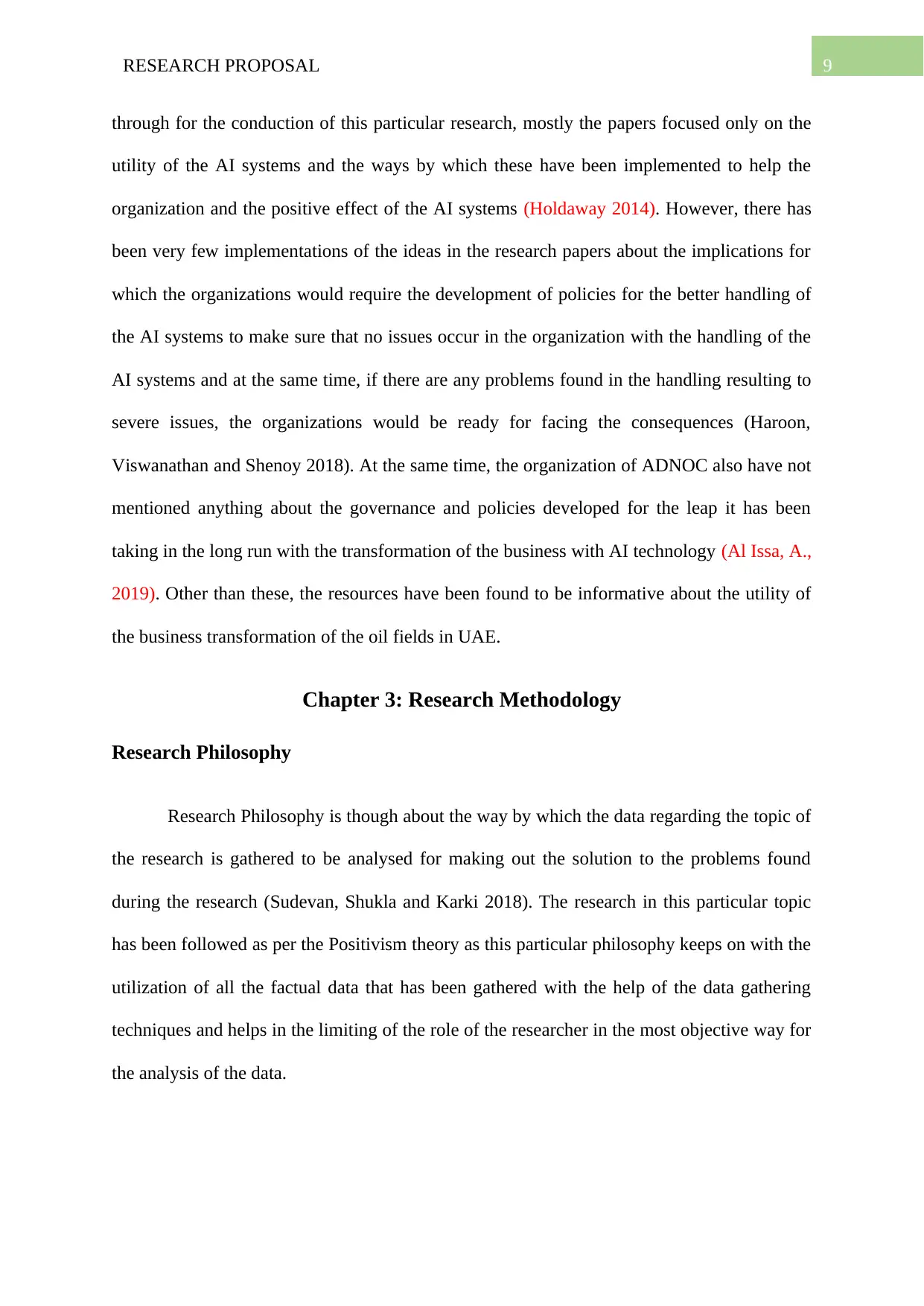
9RESEARCH PROPOSAL
through for the conduction of this particular research, mostly the papers focused only on the
utility of the AI systems and the ways by which these have been implemented to help the
organization and the positive effect of the AI systems (Holdaway 2014). However, there has
been very few implementations of the ideas in the research papers about the implications for
which the organizations would require the development of policies for the better handling of
the AI systems to make sure that no issues occur in the organization with the handling of the
AI systems and at the same time, if there are any problems found in the handling resulting to
severe issues, the organizations would be ready for facing the consequences (Haroon,
Viswanathan and Shenoy 2018). At the same time, the organization of ADNOC also have not
mentioned anything about the governance and policies developed for the leap it has been
taking in the long run with the transformation of the business with AI technology (Al Issa, A.,
2019). Other than these, the resources have been found to be informative about the utility of
the business transformation of the oil fields in UAE.
Chapter 3: Research Methodology
Research Philosophy
Research Philosophy is though about the way by which the data regarding the topic of
the research is gathered to be analysed for making out the solution to the problems found
during the research (Sudevan, Shukla and Karki 2018). The research in this particular topic
has been followed as per the Positivism theory as this particular philosophy keeps on with the
utilization of all the factual data that has been gathered with the help of the data gathering
techniques and helps in the limiting of the role of the researcher in the most objective way for
the analysis of the data.
through for the conduction of this particular research, mostly the papers focused only on the
utility of the AI systems and the ways by which these have been implemented to help the
organization and the positive effect of the AI systems (Holdaway 2014). However, there has
been very few implementations of the ideas in the research papers about the implications for
which the organizations would require the development of policies for the better handling of
the AI systems to make sure that no issues occur in the organization with the handling of the
AI systems and at the same time, if there are any problems found in the handling resulting to
severe issues, the organizations would be ready for facing the consequences (Haroon,
Viswanathan and Shenoy 2018). At the same time, the organization of ADNOC also have not
mentioned anything about the governance and policies developed for the leap it has been
taking in the long run with the transformation of the business with AI technology (Al Issa, A.,
2019). Other than these, the resources have been found to be informative about the utility of
the business transformation of the oil fields in UAE.
Chapter 3: Research Methodology
Research Philosophy
Research Philosophy is though about the way by which the data regarding the topic of
the research is gathered to be analysed for making out the solution to the problems found
during the research (Sudevan, Shukla and Karki 2018). The research in this particular topic
has been followed as per the Positivism theory as this particular philosophy keeps on with the
utilization of all the factual data that has been gathered with the help of the data gathering
techniques and helps in the limiting of the role of the researcher in the most objective way for
the analysis of the data.
Paraphrase This Document
Need a fresh take? Get an instant paraphrase of this document with our AI Paraphraser
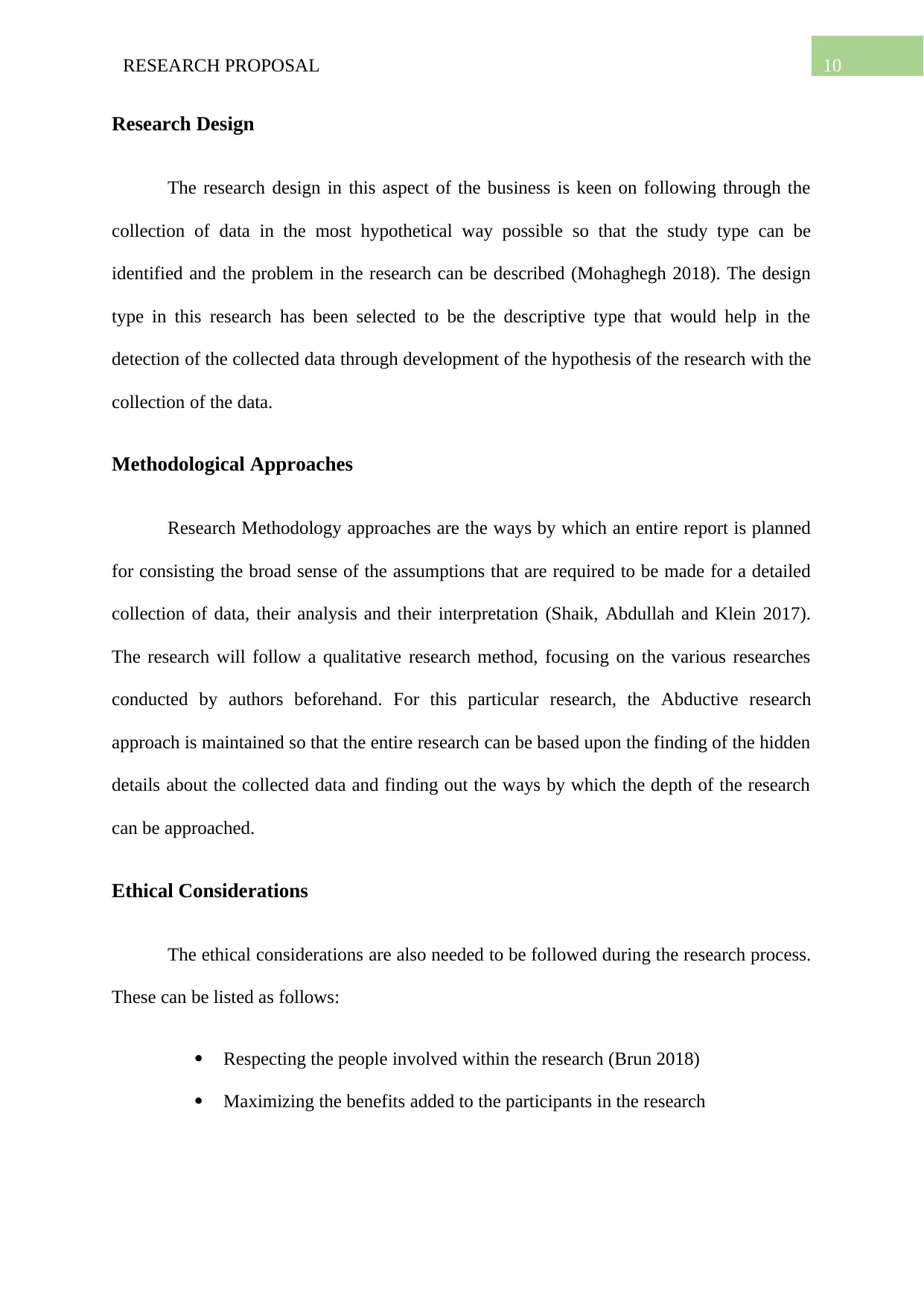
10RESEARCH PROPOSAL
Research Design
The research design in this aspect of the business is keen on following through the
collection of data in the most hypothetical way possible so that the study type can be
identified and the problem in the research can be described (Mohaghegh 2018). The design
type in this research has been selected to be the descriptive type that would help in the
detection of the collected data through development of the hypothesis of the research with the
collection of the data.
Methodological Approaches
Research Methodology approaches are the ways by which an entire report is planned
for consisting the broad sense of the assumptions that are required to be made for a detailed
collection of data, their analysis and their interpretation (Shaik, Abdullah and Klein 2017).
The research will follow a qualitative research method, focusing on the various researches
conducted by authors beforehand. For this particular research, the Abductive research
approach is maintained so that the entire research can be based upon the finding of the hidden
details about the collected data and finding out the ways by which the depth of the research
can be approached.
Ethical Considerations
The ethical considerations are also needed to be followed during the research process.
These can be listed as follows:
Respecting the people involved within the research (Brun 2018)
Maximizing the benefits added to the participants in the research
Research Design
The research design in this aspect of the business is keen on following through the
collection of data in the most hypothetical way possible so that the study type can be
identified and the problem in the research can be described (Mohaghegh 2018). The design
type in this research has been selected to be the descriptive type that would help in the
detection of the collected data through development of the hypothesis of the research with the
collection of the data.
Methodological Approaches
Research Methodology approaches are the ways by which an entire report is planned
for consisting the broad sense of the assumptions that are required to be made for a detailed
collection of data, their analysis and their interpretation (Shaik, Abdullah and Klein 2017).
The research will follow a qualitative research method, focusing on the various researches
conducted by authors beforehand. For this particular research, the Abductive research
approach is maintained so that the entire research can be based upon the finding of the hidden
details about the collected data and finding out the ways by which the depth of the research
can be approached.
Ethical Considerations
The ethical considerations are also needed to be followed during the research process.
These can be listed as follows:
Respecting the people involved within the research (Brun 2018)
Maximizing the benefits added to the participants in the research
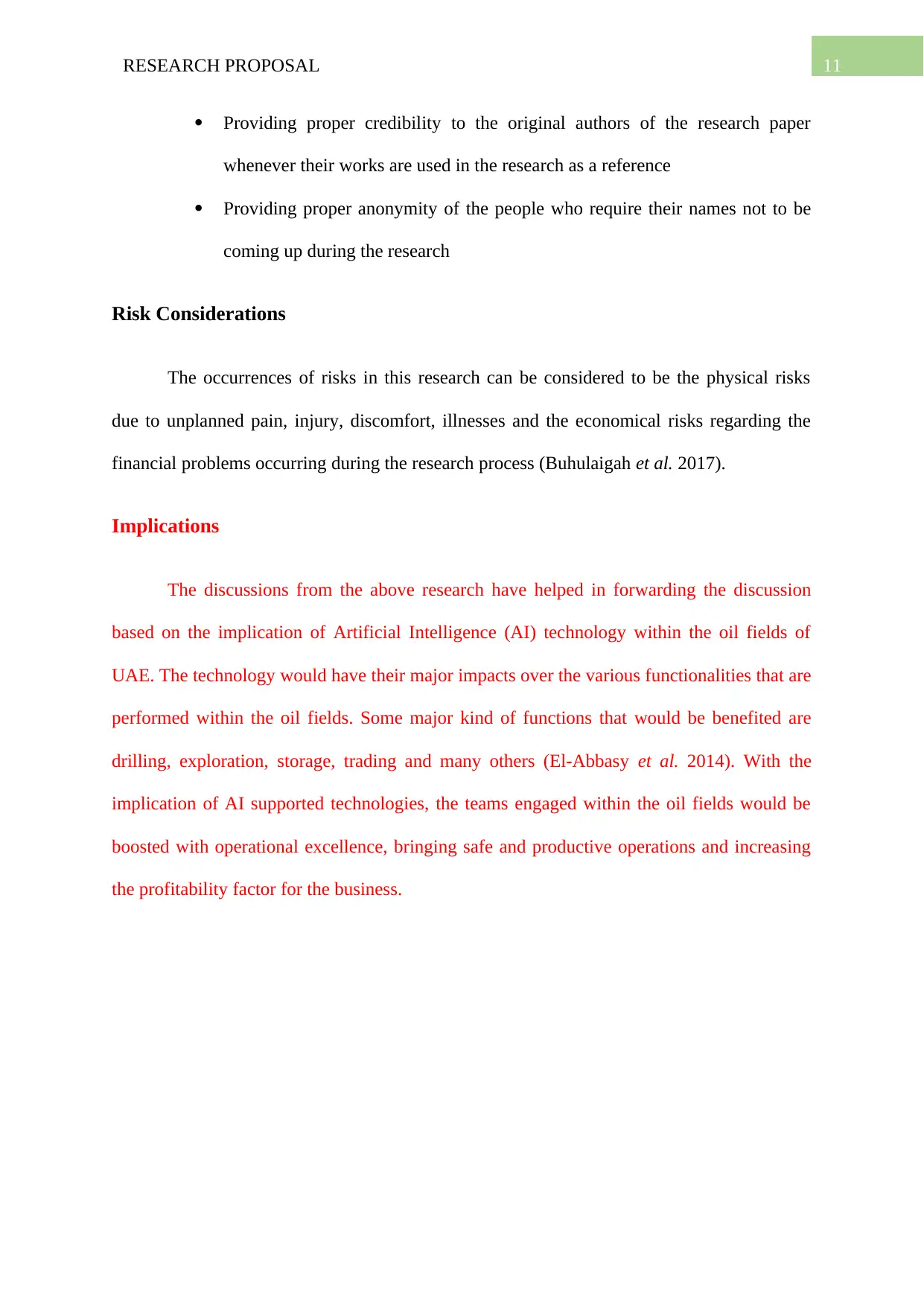
11RESEARCH PROPOSAL
Providing proper credibility to the original authors of the research paper
whenever their works are used in the research as a reference
Providing proper anonymity of the people who require their names not to be
coming up during the research
Risk Considerations
The occurrences of risks in this research can be considered to be the physical risks
due to unplanned pain, injury, discomfort, illnesses and the economical risks regarding the
financial problems occurring during the research process (Buhulaigah et al. 2017).
Implications
The discussions from the above research have helped in forwarding the discussion
based on the implication of Artificial Intelligence (AI) technology within the oil fields of
UAE. The technology would have their major impacts over the various functionalities that are
performed within the oil fields. Some major kind of functions that would be benefited are
drilling, exploration, storage, trading and many others (El-Abbasy et al. 2014). With the
implication of AI supported technologies, the teams engaged within the oil fields would be
boosted with operational excellence, bringing safe and productive operations and increasing
the profitability factor for the business.
Providing proper credibility to the original authors of the research paper
whenever their works are used in the research as a reference
Providing proper anonymity of the people who require their names not to be
coming up during the research
Risk Considerations
The occurrences of risks in this research can be considered to be the physical risks
due to unplanned pain, injury, discomfort, illnesses and the economical risks regarding the
financial problems occurring during the research process (Buhulaigah et al. 2017).
Implications
The discussions from the above research have helped in forwarding the discussion
based on the implication of Artificial Intelligence (AI) technology within the oil fields of
UAE. The technology would have their major impacts over the various functionalities that are
performed within the oil fields. Some major kind of functions that would be benefited are
drilling, exploration, storage, trading and many others (El-Abbasy et al. 2014). With the
implication of AI supported technologies, the teams engaged within the oil fields would be
boosted with operational excellence, bringing safe and productive operations and increasing
the profitability factor for the business.
⊘ This is a preview!⊘
Do you want full access?
Subscribe today to unlock all pages.

Trusted by 1+ million students worldwide
1 out of 17
Related Documents
Your All-in-One AI-Powered Toolkit for Academic Success.
+13062052269
info@desklib.com
Available 24*7 on WhatsApp / Email
![[object Object]](/_next/static/media/star-bottom.7253800d.svg)
Unlock your academic potential
Copyright © 2020–2026 A2Z Services. All Rights Reserved. Developed and managed by ZUCOL.





